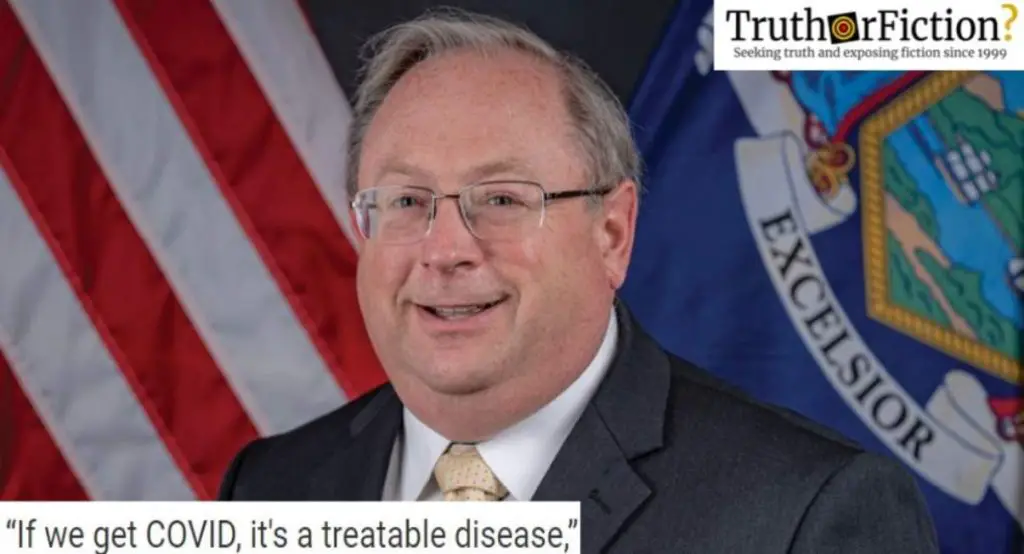In attempting to reassure New Yorkers wary of COVID-19, the head of the state’s department of health ignored the virus’ long-term effects in August 2023.
“If we get COVID, it’s a treatable disease,” Dr. Jim McDonald said in an interview with public radio station WAMC-FM. “Strep throat is a treatable disease, but it wasn’t always a treatable disease. But right now, if we have a sore throat, we think we have strep throat, we go to our doctor, we get some penicillin. We’re feeling better the next day. I’m not saying COVID is going to be like that. But I think we need to think about it that way. If you get sick with COVID, it’s treatable.”
Fact Check
Claim: NY Health Commissioner says COVID-19 is a treatable disease
Description: In an interview, the NY Health Commissioner Dr. Jim McDonald said ‘if we get COVID, it’s a treatable disease’, ignoring the issue of long-term effects from COVID-19, also known as Long COVID.
However, McDonald — the state health commissioner — failed to mention the issue of long-term effects from COVID-19, a condition commonly known as Long COVID. As Time magazine summarized in September 2022:
Long COVID can take many forms, including exhaustion, cognitive dysfunction, neurological issues, and chronic pain. People can develop it whether they’re young or old, sick or healthy, vaccinated or not. And while some people get better in a matter of months, recent studies and many patient experiences show symptoms can last years. There is no known cure for Long COVID, and the only way to prevent it is not to get infected at all.
As we have previously noted, the National Institutes of Health (NIH) has only recently begun conducting clinical trials into possible treatments for Long COVID. But even as the NIH has spent $1 billion in researching Long COVID, the medical news site STAT News has reported that the agency’s efforts have been hampered by both a “glacial” pace to its work and criticism from medical experts and advocates:
The agency isn’t asking Congress for any more funding for long Covid research, and STAT and MuckRock obtained documents showing the NIH refuses to use its own money to change course.
“So far, I don’t think we’ve gotten anything for a billion dollars,” said Ezekiel Emanuel, a physician, vice provost for global initiatives, and co-director of the Healthcare Transformation Institute at the University of Pennsylvania. “That is just unacceptable, and it’s a serious dysfunction.”
In the interview, McDonald claimed that he contracted the virus for the first time in July 2023 and took the antiviral drug Paxlovid “22 hours” after testing positive and seeing a doctor within one day of testing positive for COVID-19.
“Sixteen hours after I took my first dose, I could tell I was heading in the right direction,” he told WAMC. “I think that’s an important thing for people to put context around.”
However, McDonald did not mention that the Food and Drug Administration (FDA) has not approved use of the drug for the period immediately following an infection; nor did he mention that the FDA has specific guidelines for its use. In January 2023, the FDA withdrew its approval for Evusheld, the only medication that was available at the time for patients with compromised immune systems.
The interview aired amid an increase in hospitalizations around the state because of a new COVID-19 variant, EG.5, also referred to as “Eris.”
The city of New York’s department of health and mental hygiene has urged residents to “consider wearing a mask, especially in crowded indoor settings and particularly if you are over 65 or have a medical condition that puts you at risk for severe COVID-19”:
The department also released a statement on August 24 2023 saying that it was monitoring for signs of a separate variant, BA.2.86.
We contacted the department of health asking why McDonald failed to mention Long COVID. We have yet to receive a response.
Correction, 8/25/2023: We updated the story to properly attribute a graphic to the New York City Department of Health and Mental Hygiene — ag.
- New York State Health Commissioner Says New COVID Variants are Highly Treatable
- New Variant Drives Up COVID-19 Hospitalizations in New York
- New York State Department of Health and Wadsworth Center Continue to Monitor for COVID-19 Variants
- Long COVID Experts and Advocates Say the Government Is Ignoring 'the Greatest Mass-Disabling Event in Human History'
- Long COVID Persists as a Mass Disabling Event
- The NIH Has Poured $1 Billion Into Long Covid Research — with Little to Show for It

